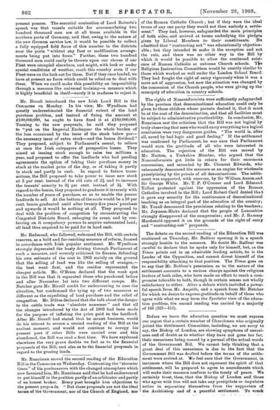The rights of Nonconformists were sufficiently safeguarded by the provisos
that denominational eduoation could only be given to those children whose parents desired it, that it must, be at the cost of the denomination, and that all facilities mud be subject to administrative practicability. In conclusion, Mr. Runciman met the criticism that the Bill was not logical by truly observing that men who would carry everything to a logical conclusion were very dangerous guides. "The world is, after all, saved by bad logic and good feeling." If the settlement was confirmed by Parliament, he was sure that Parliament would earn the gratitude of all who were interested in education. The rejection of the Bill was moved by .Mr. Hutton, a Yorkshire Member, who argued that the Nonconformists got little in return for their enormous concessions, and seconded. by Mr. Clement Edwards, who vehemently denounced the measure as an engine for wholesale proselytising by the priests of all denominations. The settle- ment was supported, with reserves, by Sir William Anson.and Sir George White.. Mr. T. P. O'Connor and Lord Edmund Talbot protested against the oppression of the Roman, Catholics involved in the Bill; Lord Robert Cecil denied that it gave any security for the continuance of denoniinational teaching as an integral part of the education of the country; Mr. Yoxall denounced the provisions relating to the teachers; Mr. Joynson-Hicks declared that the people of Lancashire strongly disapproved of the compromise; and Mr. J. Ramsay Macdonald opposed it on the grounds of the right of entry and " contracting-out " proposals.


















































 Previous page
Previous page